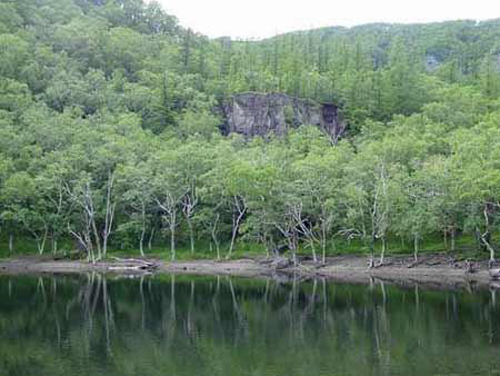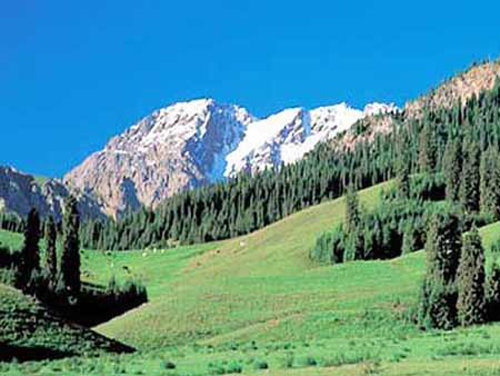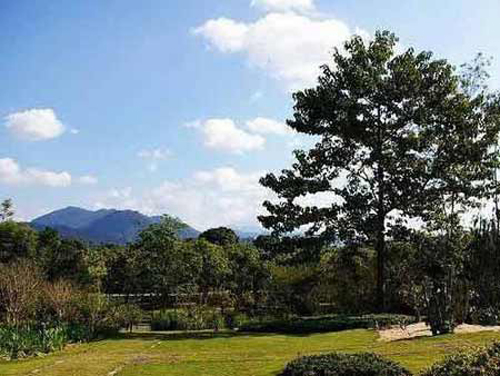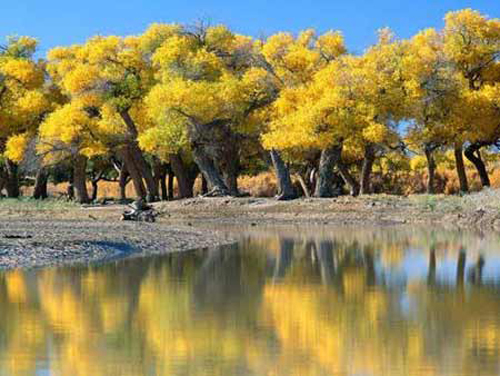more>>More News
- National Day
- ways to integrate into Chinese style life
- Should they be in the same university with me?!!
- Chinese Ping Pang Legend: the Sun Will Never Set
- A Glance of those Funny University Associations
- mahjong----The game of a brand new sexy
- Magpie Festival
- Park Shares Zongzi for Dragon Boat Festival
- Yue Fei —— Great Hero
- Mei Lanfang——Master of Peking Opera
Top 10 Most Beautiful Forests in China
By admin on 2015-01-26

1.Mixed coniferous broad-leaved forest of Changbai
Mountain, Heilongjiang
Mixed coniferous broad-leaved forests dominated by
Korean pines are the most typical forest type in Northeast China. Heilongjiang
Province established Fenglin Nature Reserve in the south of the Lesser Khingan
Ranges in 1958, where 80 percent of China's Korean pines grow. The Korean pine,
which reaches a mature height of 30-40 meters, is a unique tree species in the
northeast of China. A popular ornamental tree in parks and large gardens where
the climate is cold, it is also a good architectural material and its seeds
contain 70 percent oil. With an area of 18,400 hectares, the Fengtai Nature
Reserve contains 568 kinds of plants and has become a nature museum for
biologists to research this kind of forest ecosystem.

2. Picea schrenkiana forest of Tianshan Mountains,
Xinjiang
The picea schrenkiana, a kind of coniferous evergreen, is a unique
species on Tianshan Mountains. Its needles, or leaves, are slightly bent and its
pine cones are shaped like an eclipse. It is said to have been transferred from
the Qinghai-Tibetan Plateau 40 million years ago and have evolved into a unique
tree species in the northwest of China. These trees cover 90 percent of Tianshan
Mountains and are most luxuriant on Nalati Mountain along Yili Lake, where they
grow up to 60 meters and are commonly more than 300-400 years old. Their roots
grow deep into the soil to absorb water, and each mature tree can store 2.5 tons
of water.
3. Tropical rainforest of Jianfeng Mountain,
Hainan
With an area of 447 square kilometers, the tropical rainforest of
Jianfeng Mountain is located in the north of Sanya on Hainan Island. It is the
largest and best-preserved tropical rainforest in China. The lake on the
mountain keeps an average temperature of 19-24.5 degrees Celsius, which makes it
a good resort in the summer. The forest contains 75 percent of Hainan's
vegetation, including 78 kinds of rare vegetations under state protection and
hundreds of rare commercial tree species. It has also been named a "Paradise of
Wild Animals," in which 68 kinds of mammals, 215 kinds of birds, 400 kinds of
butterflies, 4,000 kinds of insects, 38 kinds of amphibians and 50 kinds of
reptiles live.

4. Alpine cuckoo forest of Baima Snow Mountain,
Yunnan
With an area of 190,144 hectares, the Baima Snow Mountain is located
in Deqin County of Yunnan Province. The Baima Snow Mountain was confirmed as a
national nature reserve in 1988 to protect the alpine coniferous forest, the
altitudinal belt of mountainous vegetation and the golden monkey.
The reserve is located in the Hengduan Mountains and contains 20 mountains above 5,000 meters. The vegetation is distributed vertically in the mountains and there are up to 16 vegetation belts within no more than 40 kilometers.

5. Linzhi spruce forest of Bomigang Village,
Tibet
With an area of 4,600 hectares, the Linzhi spruce forest of Bomigang
Village is located in Zhamu County of Tibet. The forests cover 61 percent of the
area. It was listed as a coniferous nature reserve in 1984. Bomigang Village is
located in the northeast of Brahmaputra, where the special geographical location
brings abundant rain and mild temperature. The vegetation changes as the
altitude of the mountain rises. The forests flourish in the area and produce
abundant lumber. Each hectare of the forest can produce 2,400 square meters,
three times as much as the forests in Northeast China. The trees are 300-400
years old, have trunk diameters between 1.5-2.5 meters and can reach a height of
75-80 meters. The forest is the most productive dark coniferous forest in the
world.
6. Tropical rainforest of Xishuangbanna,
Yunnan
With an area of some 2,402 square kilometers, the tropical rainforest
of Xishuangbanna is located in Yunnan Province. It is the only well-preserved
tropical rainforest in the world. There are many forest types in the area, as
well as eight vegetation types and 3,500 plants, among which there are 58 kinds
of rare vegetation under state protection. The rainforest is one of genetic gene
banks where tropical vegetations are most concentrated, which is very important
for science research.

7. Luntai diversiform-leaved poplar forest,
Xinjiang
Luntai County is situated at the southern foot of Tianshan Mountain,
on the north border of Tarim Basin. Here lies the 26,000-hectare forest of
diversiform-leaved poplars, which is the largest in area and density as well as
the best-preserved of its kind in the world. The forest vegetation is typical of
the Tarim River Basin, distributed in both the upper and lower valleys. Despite
its simple structure, the trees bear distinctly the imprint of the
characteristics of the region. The name of this kind of poplar tree means "the
most beautiful tree" in the Uygur language. It is also called "the hero in the
desert" thanks to its vigor and ability to withstand drought, sand and wind. The
poplars, along with many other desert plants, are a revelation about life and
death. Bathed in the glow of the rising and setting sun, they produce a sense of
mystery and bring hope and vitality to people.
8. Maolan karst forest in Libo, Guizhou
The Maolan
National Nature Reserve lies in southeast Libo County, Guizhou Province. The
reserve covers an area of 21,100 hectares and the forest coverage rate is up to
about 88 percent. According to statistics, the karst forest is a rare original
forest to survive with Central Asian tropical karst features. The forest and
karst formations create an ecological system of profound scientific value. It
provides a natural science museum of karst formations for scientific research as
well as particularly fascinating scenery. Unlike most other karst scenic areas,
which are usually barren, the Maolan forest integrates hills, waters,
underground caves and green trees, presenting a beautiful picture.
9. Latchen forest in the Daxing'an Mountains,
Heilongjiang and Inner Mongolia
The deciduous coniferous forest in the north
Daxing'an Mountains of China is the southern extension of the deciduous
coniferous forest system of southeastern Siberia. The elevation of Daxing'an
Mountains is about 600 to 1,000 meters, with some peaks reaching as high as
1,400 meters. The average temperature in the region is from 1.2 degrees Celsius
below zero to five degrees Celsius, and the annual precipitation is 400 to 600
millimeters.
The vegetation in the region varies with the rise in altitude, showing distinctly the phenomenon of vertical differentiation.
10. Shunan bamboo forest, Yibin, Sichuan
The
Shunan Bamboo Sea is located in Yibin of southern Sichuan Province. Covering
over 4,000 hectares with a vast plantation of bamboo, the site has been a rare
and famous scenic area since ancient times. Literally a world of different types
of bamboo trees covering over 500 hills, the forest stretches as far as the eye
can see and fills the air with the fragrance of bamboo. Favorable mild
temperatures year-round make it an ideal tourist destination. Among the ocean of
bamboo lies a narrow five-kilometer path. Walking along this "Jade Green
Corridor", the fresh air and sound of the green waves rustling in the wind
create a heavenly experience.
- Contact Us
-
Tel:
0086-571-88165708
0086-571-88165512E-mail:
admission@cuecc.com
- About Us
- Who We Are What we do Why CUECC How to Apply
- Address
- Study in China TESOL in China
Hangzhou Jiaoyu Science and Technology Co.LTD.
Copyright 2003-2024, All rights reserved




 Chinese
Chinese
 English
English
 Korean
Korean
 Japanese
Japanese
 French
French
 Russian
Russian
 Vietnamese
Vietnamese
